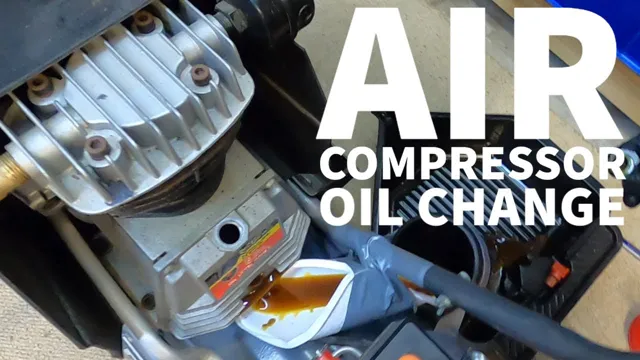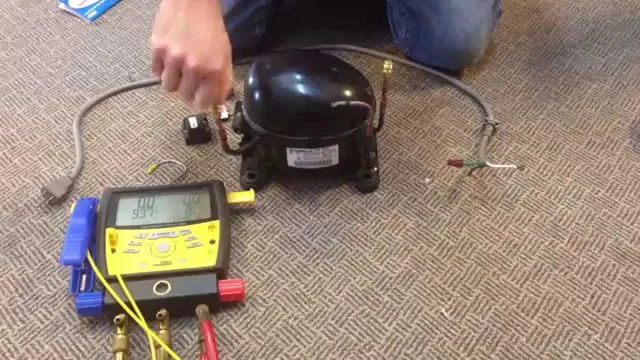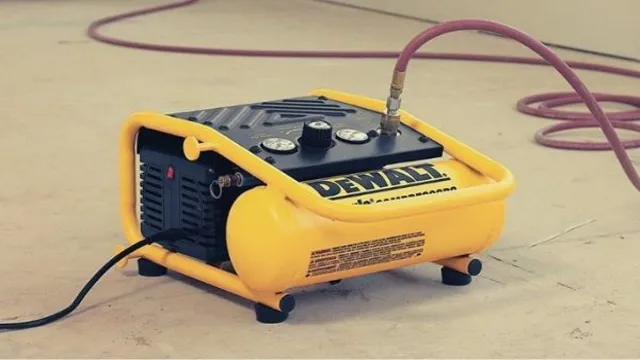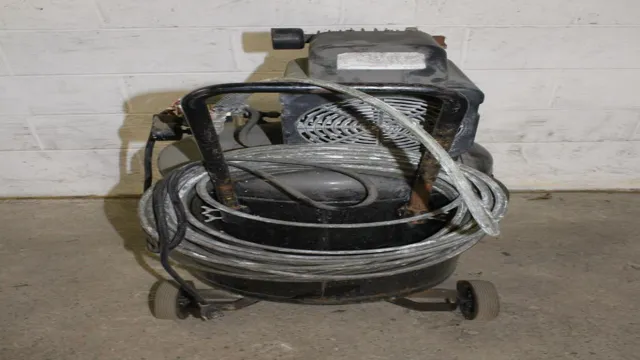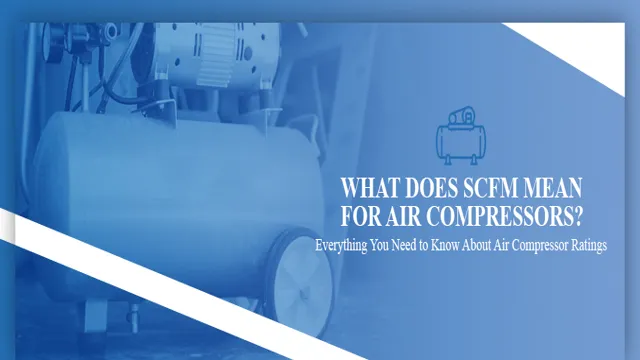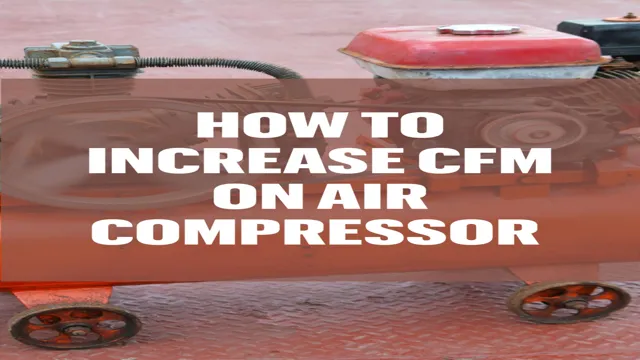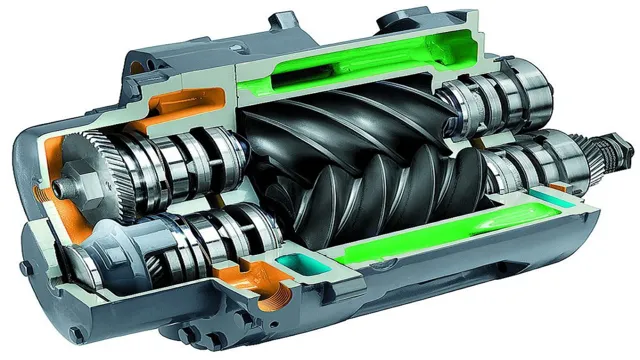How Do You Know If Your Air Compressor Is Bad? Check for These Critical Symptoms.

Air compressors are popular pieces of equipment that you may find in shops, factories, and construction sites. They are commonly used to power tools and machinery via compressed air. However, like any equipment, these machines may experience malfunctions from time to time.
Is your air compressor making strange noises, emitting unusual odors, or failing to function as it once did? In this blog, we’ll take a closer look at some of the telltale signs that your air compressor may be malfunctioning and explore what you can do to fix the issue. From broken belts to clogged filters, we’ve got you covered with tips and tricks to ensure that your air compressor remains in tip-top shape.
What is an Air Compressor?
If you have an air compressor, it’s essential to know if it’s functioning correctly. But how do you know if your air compressor is bad? One telltale sign is if it’s performing poorly or not at all. For example, if you’re not getting the same amount of air pressure as before or if it’s taking longer to reach the desired pressure level, these could be signs that your air compressor is struggling.
You may also notice unusual sounds or smells coming from the machine, which could indicate a problem. In some cases, the issue could be a minor one that can be quickly fixed, like replacing a worn-out filter. Other times, it may be more severe, requiring a more significant repair or even a replacement.
In either case, it’s important to address the issue promptly to avoid further damage or potential safety hazards.
Definition and Function
An air compressor is a machine that compresses air to a high pressure which can be then transported through a pipe or hose to power various tools and equipment. The machine uses an electric or gasoline motor to suck in air and compress it, which is then stored in a tank until it is ready to be released. You may be wondering why compressed air would be useful, but it’s actually a highly versatile source of power.
From inflating tires to powering nail guns, sandblasters, and even spray painters, an air compressor is an incredibly useful tool to have in your workshop or garage. With a wide range of sizes and styles available, from portable models to large industrial stationary units, there’s an air compressor to suit every need. So next time you’ve got a DIY project or home repair task to tackle, consider investing in an air compressor, and see how it can make your life easier!

Types of Air Compressors
An air compressor is a machine that increases the pressure of air to create kinetic energy, which can then be used for different purposes like power tools or industrial applications. There are several types of air compressors in the market, each varying in size, shape, and mechanism. The most common type is the reciprocating air compressor, which uses pistons to compress air inside a cylinder.
Then there’s the rotary screw air compressor, which utilizes two helical screws to compress air. They’re better suited for high volume applications where continuous air flow is needed. Another option is the centrifugal compressor, which uses centrifugal force to compress air and is exceptionally efficient in large-scale industrial settings.
It’s essential to choose the right type of air compressor depending on the specific task at hand to make sure it meets the application’s needs.
Signs of a Faulty Air Compressor
If you’re wondering how to know if your air compressor is bad, there are a few telltale signs to look out for. Firstly, if you notice that the air pressure is consistently low, or if it takes longer than usual for the tank to fill up, this could indicate a faulty air compressor. You may also hear strange noises such as hissing or banging, or notice leaks around the compressor itself.
Additionally, if the motor struggles to turn on, or shuts off unexpectedly, this could be a sign that the compressor is struggling. If you notice any of these issues, it’s important to get your air compressor checked out by a professional as soon as possible to avoid any further damage or safety hazards.
Abnormal Sounds
If you’re hearing abnormal sounds coming from your air compressor, it’s a warning sign that something isn’t quite right. While some sounds may be normal, such as a low hum or vibration, certain noises can indicate a faulty air compressor. For example, a grinding or rattling sound may suggest that the bearings are wearing out or that there’s debris caught in the system.
Alternatively, if you notice a screeching or screaming noise, it could be that the motor is overheating or seizing up. Whatever the cause, it’s important not to ignore these sounds, as they could lead to further damage to your compressor or even pose a safety risk in some cases. Therefore, regular maintenance and inspection can help identify and prevent potential issues in your air compressor before they cause significant damage.
It’s crucial to check the compressor’s oil level and change it if it’s dirty or low. In addition, you should keep an eye out for any leaks, corrosion, or loose parts that need tightening. By paying attention to these warning signs and taking timely action, you can keep your air compressor running smoothly and efficiently for longer.
Remember, prevention is better than cure, and your air compressor is a valuable investment that deserves adequate care and attention.
Reduced Pressure
Reduced Pressure One of the most significant indicators that your air compressor is faulty is reduced pressure. If you notice that the pressure of your compressed air is lower than usual, it may be a sign of a malfunction. There could be several reasons why your air compressor pressure has decreased, such as issues with the compressor’s valves, clogged filters, leaks, or a faulty regulator.
A reduced pressure could lead to a decrease in efficiency, which can affect your work or project negatively. Therefore, checking your air compressor and identifying the fault is crucial to maintain its optimal performance. Don’t hesitate to reach out to a professional technician to diagnose and fix the problem before it worsens.
This way, you can avoid repairs that may result in costly damages in the long run. Remember, regular maintenance can keep your air compressor running efficiently and prevent unexpected malfunctions.
Leaking Air
Air compressors are essential equipments in a variety of industries. However, like any piece of machinery, air compressors can develop faults over time, which can compromise their efficiency and functionality. One of the most common issues with air compressors is leaking air.
This can be caused by a range of factors, including worn-out seals, corroded pipes, and loose fittings. If you notice a hissing sound coming from your compressor, it’s a clear sign that air is escaping. You may also notice a drop in pressure, which can result in reduced performance levels.
To address the issue, you should conduct regular checks on your compressor and keep an eye out for any signs of wear and tear. Replace any faulty parts immediately and tighten any loose fittings to prevent further leakage. By doing so, you can ensure that your air compressor operates at optimal efficiency, saving you time and money.
Troubleshooting a Bad Air Compressor
Air compressors are an essential tool in many industries, but like any machine, they can become faulty or experience issues over time. So, how do you know if your air compressor is bad? One of the most common signs is a decrease in air pressure or a noticeable loss of power. This problem could potentially be caused by a worn-out piston ring or a valve issue.
Another symptom of a bad air compressor is unusual noises. If your compressor is making excessive or strange sounds, it may indicate a problem with the motor or parts needs to be lubricated. Leaks are another concern to watch out for.
If air is escaping from any hoses or valves, this can greatly affect the efficiency of your compressor and lead to higher energy bills. Lastly, if your compressor frequently trips the circuit breaker in your garage, it’s a strong indication that there’s an electrical issue. When in doubt, it’s always best to consult a professional who can diagnose and fix any issues to keep your compressor running smoothly.
Check for Damaged Parts
While an air compressor can be a highly useful tool, it can also act up at times, causing frustration and lost productivity. One troubleshooting step to conduct when dealing with a malfunctioning air compressor is to check for damaged parts. Start by examining the compressor’s hoses and couplers for cracks or leaks, which could be causing the issue.
Inspect the air filter and replace it if it looks dirty or clogged. Additionally, pay attention to the compressor’s pressure switch, which controls how much air the compressor builds up. If this switch is faulty or worn out, it may need to be replaced.
Remember to always turn off the compressor and unplug it before attempting to diagnose or fix any issues. Checking for damaged parts can help you pinpoint the root of the problem and get your air compressor back in working order.
Examine the Power Source
When troubleshooting a bad air compressor, one of the first things you should examine is the power source. A common reason why air compressors fail to turn on or operate correctly is due to a faulty power source or insufficient power supply. Before investigating further, ensure that the power source is turned on, plugged in correctly, and has the proper voltage and amperage to operate the compressor.
If you find that the power source is defective, it is essential to turn off the compressor and replace the faulty part before operating it again. With a strong and steady power supply, your air compressor will operate smoothly and effectively, ensuring that your projects are completed with ease.
Conclusion
In summary, if your air compressor is acting up, it’s time to put your detective hat on and start investigating. From strange noises and overheating to poor air output, these signs can indicate that your trusty machine is on its last legs. However, by taking note of these symptoms and addressing them early on, you can save yourself a lot of time, money, and headache down the road.
So don’t ignore the warning signs – take charge, and keep those air tools at the ready!”
FAQs
How do I diagnose if my air compressor is bad?
There are a few signs to look out for. A decrease in air pressure, unusual sounds or vibrations, leaking oil or air, and an overheating motor are all indicators that your air compressor may be malfunctioning.
Can a bad air compressor cause damage to my tools?
Yes, a faulty air compressor can cause damage to your tools. If the air pressure drops or fluctuates excessively, it can affect the performance and lifespan of your tools. It is important to regularly check and maintain your air compressor to prevent this from happening.
How often should I service my air compressor?
It is recommended to service your air compressor every 500 to 1000 hours of use. This includes cleaning or replacing filters, checking and changing oil, and inspecting and tightening all components. Regular maintenance will prolong the lifespan of your air compressor and prevent breakdowns.
Can I use my air compressor for painting?
Yes, air compressors are often used for painting and other types of finishing work. However, it is important to use the correct type of paint gun and to properly clean and maintain both the gun and compressor to ensure a smooth and even finish.
How do I choose the right size air compressor for my needs?
The size of air compressor you need depends on the type of work you will be doing and the tools you will be using. To determine the necessary size, consider the CFM (cubic feet per minute) requirements of each tool and purchase an air compressor with a higher CFM rating than the highest rated tool.
How do I prevent moisture buildup in my air compressor?
Moisture buildup in your air compressor can cause rust and damage to internal components. To prevent this, install a water separator and drain the air tank regularly. Additionally, use a synthetic compressor oil that is formulated to resist water contamination.
What should I do if my air compressor won’t turn on?
There are a few things to check if your air compressor won’t turn on. First, ensure that it is properly plugged in and switched on. Next, check the pressure switch and reset it if necessary. If none of these solutions work, the motor may need to be replaced or serviced by a professional.

